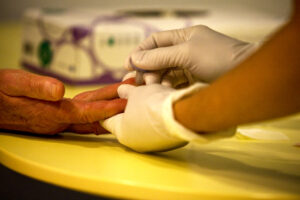Families caring for dying relatives need better support with medication
Families who are caring for a relative who is seriously ill and dying at home need more support from healthcare professionals in order to help manage their medication, a study has found.
The findings of the study, funded by the National Institute for Health Research (NIHR) and led by Professor Kristian Pollock from the University of Nottingham, are published in Palliative Medicine.
When somebody is seriously ill and dying at home, managing their medications can be a difficult and complex task. This is made more difficult given that the care often needs to be given when patients and their families are tired and emotional.
Family members are often assumed to be willing and able to support patients with their medication. However, little is known about what these tasks involve or how families cope with them.
In this study, a team of experts explored the views of patients and families managing medications in their homes. The study reports the outcomes of 21 interviews with bereaved family caregivers and 43 interviews with patients and current family caregivers.
The research found:
- More awareness is needed to understand the ways that managing medications add to the considerable burden of care and work that must be undertaken when someone is seriously ill and dying at home;
- Family caregivers are increasingly expected to undertake complex and technical medication tasks formerly carried out by professionals, but with little if any training, supervision or support; this trend has been exacerbated by Covid-19
- The work of managing medications is critical to enabling patients to remain at home at the end of life.

The findings of the research have implications for practice and policy:
- Health care professionals will benefit from a greater understanding of the complexities of medications management undertaken by patients and families in order to identify and tailor the support they can provide.
- Substantial reduction in the complexity and bureaucracy of Health and Social Care services is needed for them to can be navigable for patients and families managing medications at the end of life.
- The lack of presence of Community Pharmacists in this research suggests there may be a greater role for them in supporting patients and families to manage medications at home.
Dr Eleanor Wilson, from the Nottingham Centre for the Advancement of Palliative and End of Life Care (NCARE) in the School of Health Sciences at the University of Nottingham, worked on the study.
She said: ‘Our findings show that managing medications at the end of life can be considerable ‘work’.
‘Including practical and physical work of organising, ordering and collecting medications, the emotional work of supporting someone to take their medication and the knowledge-based work of understanding what medications are for, when they should be taken and what side effects they may cause.
‘This medicines ‘work’ often needs to be done when patients and families are tired, upset and under pressure, so health professionals need to be alert to how much they are asking families to do at this time.’
The Department for Health and Social Care has been contacted for comment.
Photo Credit – National Cancer Institute















